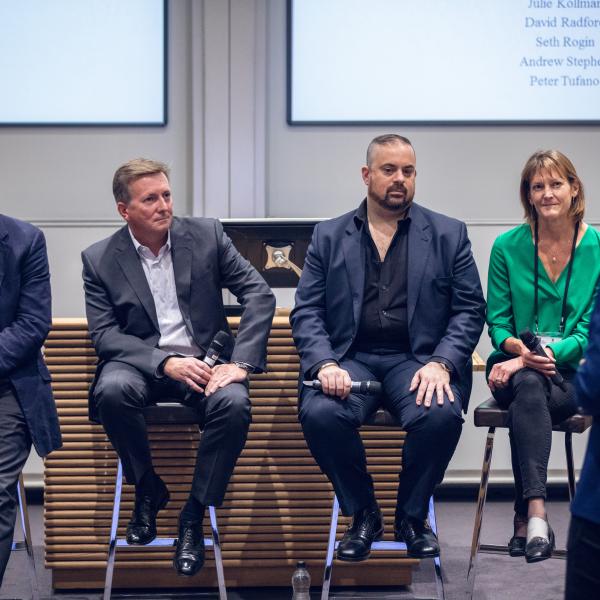About the event
The second annual Oxford Future of Marketing Symposium took place on 14 November 2018.
The event marks the 2-year anniversary of the Oxford Future of Marketing Initiative (FOMI). It provides a space for FOMI partners to convene and discuss knowledge exchange, ongoing research and key marketing issues.
Professor Andrew Stephen, Saïd Business School (SBS), introduced the symposium by questioning: Is marketing good for us?
In conversation with Dr Rhonda Hadi (SBS) and David Radford (Allianz), Stephen began by challenging the negatives associated with marketing and the problems which arise from them. Among the main issues discussed was a lower tolerance of marketing in general, in the context of a world dominated by new media.
Despite this, Hadi, Radford and Stephen agreed that marketing is ‘good for us’ and is fundamental to the growth and success of business. Radford argued: ‘Understanding the audience will anchor business where it needs to be, and fostering customer trust in business will help to encourage higher tolerance of marketing.’
The panel concluded that while a ‘rebrand of marketing in general’ may be necessary, marketers need to ‘defend what they’re doing to do it well.’ Stephen summed up by stressing that: 'We should revitalise marketing, but we should be proud of the work we’re doing.’
What can marketing learn from creative industries?
With a need to ‘revitalise’ marketing established, Dr Alex Connock (Missile) Dr Cammy Crolic (SBS) and John Summers (Halle Orchestra), discussed what marketing can learn from creative industries.
Speakers agreed that the most successful companies are the ones that are least business-like, and suggested that businesses would do well to ‘inject creativity’ into their marketing strategy. This idea supports recent research from FOMI, which finds that businesses that presented themselves with a more social, human persona on social media, as opposed to a corporate brand, had stronger brand performance from their advertising.
Connock concluded by stating that hiring new creatives and cultivating their originality would help businesses to thrive. ‘These are the people that come up with zeitgeist changing ideas. They are the ones who are looking for new ways to do things, rather than focusing on the bottom line.’
Transforming Marketing: how to thrive in a monopolistic world
Stephane Bérubé (L’Oréal) ultimately agreed with the notion that creativity within marketing is imperative for brand progression, remarking that: ‘Discovery is driven by content. At the end of the day, content will always win.’
Outlining some of the other ways in which businesses can progress, and how they can remain current, Bérubé observed that regularly reviewing existing marketing tactics and reacting to current trends, such as AI and automation, is imperative. Establishing business objectives around these trends to measure enablers of transformation, will allow businesses to react accordingly with content that is most likely to have an impact.
The role of AI and Data
Perry Nightingale (WPP) echoed this, and championed the ways in which AI can help to gather data and to progress marketing strategies. ‘AI allows the impossible to happen, it’s a mechanism for telling stories and for transformational change.’
However, we do need to constantly review datasets that we are feeding AI to eliminate bias, and to ensure marketing strategies are as considerate and representative as far as possible. Felipe Thomaz (SBS) reinforced this and remarked that we need to be more protective of data; it is an asset and must be curated.
Seth Rogin (Nucleus) echoed Nightingales’ sentiment about what AI can help us to achieve, stressing that it allows us to examine advertising success across channels, and to therefore react with more informed, creative marketing campaigns which are more likely to successfully engage with consumers.
Yasmeen Ahmad (Teradata) added to this by remarking that AI can also track consumer behaviour across different eCommerce channels. This allows companies to target the customer at strategic points within their consumer journey, rather than solely relying on ‘blanket’ marketing campaigns.
Thomaz concluded by emphasising the importance of creativity in business marketing, and its relevance within the space of data science. Dan White (Kantar), agreed, stating: ‘Data is the paint, the server is the canvas, it’s up to us to apply this to the creative side of marketing’
How does advertising work now?
In reference to all these ideas, Peter Buckley (Facebook) addressed the question: How do we encourage consumer engagement and attention to advertising?
Eye tracking studies show that people on average dedicate 1-2 seconds of attention to an advert before moving on. Longer views were found to have little impact on recall, suggesting that the first few seconds of exposure to an advertisement are the most important
In order to address this, Buckley reiterated Radford’s earlier statement that businesses need to focus on creative content, and on establishing positive associations with their brand. ‘Ads should be designed for impact. They should be recognisable in almost every context, and easy to process.’
What is marketing’s role in the boardroom?
The day concluded with a panel discussion on the relevance of marketing to the boardroom. Professor Andrew Stephen, Dean Peter Tufano (SBS), Julie Kollman (Kantar), David Radford and Seth Rogin (Nucleus) discussed questions: What is the role of marketing in the boardroom? Should the CMO be on the board? If so, how do they get there? And how can organisations grow and nurture more of a marketing mindset?
This session was recorded live for Saïd Business School and Kantar’s podcast Future Proof. Listen in full.
